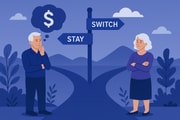Forgetfulness or Dementia? Know the Signs Before It's Too Late!
By
Seia Ibanez
- Replies 7
As we gracefully age, a little forgetfulness can be quite common. Who hasn't misplaced their keys or forgotten the name of an acquaintance? But when does forgetfulness indicate something more serious, like dementia? With nearly half a million Australians living with dementia—a figure projected to soar in the coming decades—it's crucial to distinguish between typical age-related memory lapses and the early signs of dementia.
During Dementia Action Week, we're reminded of the importance of understanding and recognizing the symptoms of dementia. It's a condition shrouded in misconceptions, with many still believing it to be a normal part of aging. However, Dementia Australia CEO Tanya Buchanan emphasizes that this is not the case. Dementia is a collection of symptoms that are the result of brain disorders, and it's not a natural aspect of growing older.
Understanding Dementia
Dementia is an umbrella term for a range of progressive conditions that affect the brain. It's not a single disease but rather a set of symptoms caused by disorders such as Alzheimer's disease, vascular dementia, and Lewy body dementia. While it's more common in those over 65, dementia can affect younger people as well.

Signs to Watch For
The symptoms of dementia can vary widely, but there are key signs that should prompt further investigation:
- Memory: Difficulties with short-term memory, such as trouble recalling recent events or the names of familiar objects or people.
- Thinking: Increased confusion, problems with concentration, planning, and problem-solving, and difficulty finding the right words.
- Behaviour: Restlessness, wandering, disturbed sleep, and challenges with everyday activities.
- Mood: Greater susceptibility to depression, anxiety, agitation, or a loss of interest in previously enjoyed activities.
Differentiating Dementia from Forgetfulness
The occasional memory slip is unlikely to significantly impact daily living, but dementia can severely affect one's ability to function independently. Dr. David Sykes from Dementia Australia's Centre for Learning points out that significant cognitive issues and changes in brain function are what set dementia apart from normal forgetfulness. Forgetting why you entered a room is common and not necessarily a sign of cognitive decline. However, not recognizing your own home or the faces of loved ones, struggling with decisions, or feeling disoriented and anxious without cause could be warning signs of dementia.
Tools like the BrainTrack app may offer some guidance in distinguishing between forgetfulness and potential dementia, but they are not substitutes for professional assessment. If you or a loved one is experiencing these symptoms, it's essential to consult a general practitioner for a proper evaluation.
Other Possible Causes
It's also important to note that cognitive decline can be caused by factors other than dementia. Professor Henry Brodaty from the Centre of Healthy Brain Ageing at the University of New South Wales reminds us that some cognitive slowing is normal with age. However, other conditions can mimic dementia symptoms, including Vitamin B12 deficiency, low thyroid function, infections, and even depression. Therefore, a thorough medical examination is crucial to rule out other treatable conditions.

Dementia Action Week serves as a reminder to stay informed and vigilant about our cognitive health. By understanding the signs of dementia and seeking timely medical advice, we can better manage our well-being and support those around us who may be facing this challenging condition. Let's open up the conversation and reduce the stigma and discrimination against those living with dementia. Share your thoughts and experiences in the comments below—your insights could be invaluable to someone else in our community.
During Dementia Action Week, we're reminded of the importance of understanding and recognizing the symptoms of dementia. It's a condition shrouded in misconceptions, with many still believing it to be a normal part of aging. However, Dementia Australia CEO Tanya Buchanan emphasizes that this is not the case. Dementia is a collection of symptoms that are the result of brain disorders, and it's not a natural aspect of growing older.
Understanding Dementia
Dementia is an umbrella term for a range of progressive conditions that affect the brain. It's not a single disease but rather a set of symptoms caused by disorders such as Alzheimer's disease, vascular dementia, and Lewy body dementia. While it's more common in those over 65, dementia can affect younger people as well.

Almost 70 per cent of Australians say they know very little about dementia, according to new data. Credit: Shutterstock
Signs to Watch For
The symptoms of dementia can vary widely, but there are key signs that should prompt further investigation:
- Memory: Difficulties with short-term memory, such as trouble recalling recent events or the names of familiar objects or people.
- Thinking: Increased confusion, problems with concentration, planning, and problem-solving, and difficulty finding the right words.
- Behaviour: Restlessness, wandering, disturbed sleep, and challenges with everyday activities.
- Mood: Greater susceptibility to depression, anxiety, agitation, or a loss of interest in previously enjoyed activities.
Differentiating Dementia from Forgetfulness
The occasional memory slip is unlikely to significantly impact daily living, but dementia can severely affect one's ability to function independently. Dr. David Sykes from Dementia Australia's Centre for Learning points out that significant cognitive issues and changes in brain function are what set dementia apart from normal forgetfulness. Forgetting why you entered a room is common and not necessarily a sign of cognitive decline. However, not recognizing your own home or the faces of loved ones, struggling with decisions, or feeling disoriented and anxious without cause could be warning signs of dementia.
Tools like the BrainTrack app may offer some guidance in distinguishing between forgetfulness and potential dementia, but they are not substitutes for professional assessment. If you or a loved one is experiencing these symptoms, it's essential to consult a general practitioner for a proper evaluation.
Other Possible Causes
It's also important to note that cognitive decline can be caused by factors other than dementia. Professor Henry Brodaty from the Centre of Healthy Brain Ageing at the University of New South Wales reminds us that some cognitive slowing is normal with age. However, other conditions can mimic dementia symptoms, including Vitamin B12 deficiency, low thyroid function, infections, and even depression. Therefore, a thorough medical examination is crucial to rule out other treatable conditions.
Key Takeaways
- Almost half a million Australians live with dementia, and the number is expected to increase without a medical breakthrough.
- Dementia is not a normal part of ageing, and the lack of community awareness contributes to discrimination against those with the condition.
- Dementia is a brain condition with symptoms affecting memory, thinking, mood, and behaviour, and can significantly impact daily living, unlike general forgetfulness.
- Conditions such as Vitamin B12 deficiency, low thyroid function, and infections can mimic dementia, and a GP is best placed to assess for potential dementia.
Dementia Action Week serves as a reminder to stay informed and vigilant about our cognitive health. By understanding the signs of dementia and seeking timely medical advice, we can better manage our well-being and support those around us who may be facing this challenging condition. Let's open up the conversation and reduce the stigma and discrimination against those living with dementia. Share your thoughts and experiences in the comments below—your insights could be invaluable to someone else in our community.







